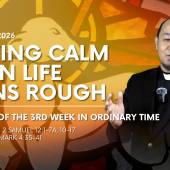Timothy has to endure in times of trials and tribulations!

October 19, 2025 Twenty-ninth Sunday in Ordinary Time
Daily Readings: Exodus 17:8-13; 2 Timothy 3:14-4:2; Luke 18:1-8
Perseverant prayer and persistence in fulfilling one’s responsibilities determine the character of a person, in addition to his or her faith. Moses recognizes the need for God. He surrenders the perilous situation of the people of Israel to God and seeks His will. God emerges, or rather is recognized, as the sole guardian of Israel. The people of God reap the harvest of their unwavering faith and prayer.
The First Reading is taken from the Book of Exodus. The Amalekites were a strong and fierce nomadic tribe controlling caravan routes between Egypt and Arabia. The Israelites were vulnerable at that time. When the Amalekites attacked, Moses and Joshua, with God’s assistance, plotted their defense. Moses took the route of prayer while instructing Joshua to wage war. The author of Exodus emphasizes the direct connection between prayer and its effects. Whenever Moses raised his hands in prayer, the Israelites were in a position to win; when his hands grew weary and fell, they were about to lose. Aaron and Hur helped Moses keep his hands raised, but they too became tired. They arranged a large stone for him to rest upon. Thus Joshua defeated Amalek and his people with a sword. It is clear that human beings need God on their side, however strong they may be. Moses knew the people of Israel were weak and could accomplish nothing without God. God was kind to hear his prayer.
The Responsorial Psalm is a Song of Ascent. It expresses faith and trust in God, the ultimate protector. The psalm is presented as a blessing from a priest and inspires confidence in pilgrims beginning their journey home. The priest emphasizes that God is ever vigilant, never sleeping, and always serving as the “guardian of Israel.” Thus, the psalm inspires confidence and courage in God’s people.
The Second Reading is taken from the Second Letter of St. Paul to Timothy, the young bishop of Ephesus. Timothy was fortunate to have his grandmother Lois, and mother Eunice teach him from childhood. He was also taught that salvation is available only through faith in Christ Jesus. In today’s text, Paul gives us one of the most important verses used by the Catholic Church to establish the divine inspiration of the Holy Bible. This verse affirms that the Bible is normative and authoritative, divinely inspired, and inerrant: “All Scripture is inspired by God and is useful for teaching, for reproof, for correction, and for training in righteousness, so that everyone who belongs to God may be proficient, equipped for every good work” (2 Timothy 3:16–17).
Paul urges Timothy to proclaim the Gospel despite many challenges. He is expected to teach, convince, rebuke, and encourage people with patience. Sound Christian doctrine will challenge and irritate some, and they may seek teachers who tell them only what they want to hear. At such critical times, Timothy must remain sober, endure suffering, work diligently as an evangelist, and carry out his ministry faithfully. Paul reflects that his own life has become like a libation poured out. He feels that his time has come, yet he experiences the joyful sense of having accomplished what was expected of him. Above all, he has kept the faith and is hopeful of receiving the crown of righteousness from the Lord, the righteous judge.
The Gospel Reading is taken from the Gospel according to St. Luke. Luke is known as the Gospel of Prayer. Jesus is depicted praying on numerous occasions, from Zechariah offering sacrifice at the beginning to Mary and the 120 disciples praying for the gift of the Holy Spirit at the Temple in Jerusalem at the end. In today’s text, Jesus emphasizes the need to pray at all times without losing heart, teaching this lesson through a parable.
The “villain” of the parable is an unjust judge, akin to a local magistrate. A Torah-observant judge would feel obliged to care for widows (cf. Deuteronomy 10:18; 14:29; 16:11), but this man neither fears God nor respects human persons and has no regard for the widow in question.
The heroine of the parable is a widow. The Hebrew word for “widow” means “silent one” or “one unable to speak.” She is typically exploited and oppressed, living in a vulnerable situation. She is desperate. Throughout the Bible, widows are viewed as under the special protection of God (cf. Jeremiah 49:11; Psalm 68:5). She keeps knocking at the judge’s door, requesting justice against her opponent. The judge grows weary of her persistence; he is disturbed by her very presence. Their encounter is public, with the entire community watching. Ultimately, despite his cruelty, the judge grants her justice because of her relentless persistence.
Jesus compares the attitude of this cruel judge to God’s. His question is simple: If a human judge grants justice because he cannot tolerate continual botheration, how much more will God grant justice to His chosen ones who cry to Him day and night? Jesus also raises a key concern: Will He find faith on earth when He returns?
Call to Action: The widow’s strategy is worth pondering. She needs our voice. For that matter, every voiceless person needs our voice. Are we ready to step in and speak for them?
Radio Veritas Asia (RVA), a media platform of the Catholic Church, aims to share Christ. RVA started in 1969 as a continental Catholic radio station to serve Asian countries in their respective local language, thus earning the tag “the Voice of Asian Christianity.” Responding to the emerging context, RVA embraced media platforms to connect with the global Asian audience via its 21 language websites and various social media platforms.














